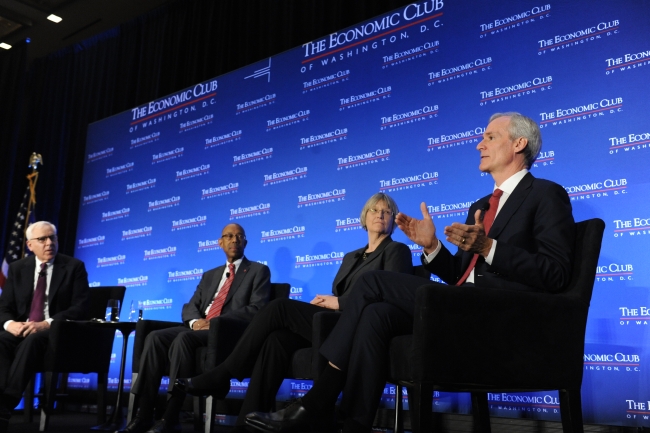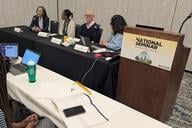You have /5 articles left.
Sign up for a free account or log in.

The Economic Club of Washington, D.C., President David M. Rubenstein led a discussion Tuesday with Ohio State University President Michael Drake, Harvard University President Drew Gilpin Faust and Stanford University President Marc Tessier-Lavigne.
The Economic Club of Washington, D.C.
WASHINGTON -- The presidents of three of the country’s top research universities gathered for a public discussion Tuesday, dedicating some of their most in-depth comments to concerns about federal policy.
The presidents of Harvard, Stanford and Ohio State Universities took part in a wide-ranging discussion on the future of higher education hosted by the Economic Club of Washington, D.C. While they covered a lot of ground, they delivered their most timely remarks while addressing worries about cuts to federal research funding and possible changes in immigration policy that could affect the students at their institutions.
Harvard President Drew Gilpin Faust said she has increased her outreach regarding federal issues this year, spending more time in this capital city meeting with Republican and Democratic lawmakers. She expressed hope legislators are receptive to her case for funding university research when they learn about the work being done.
“I’ve been trying to make the case to congresspeople, and also invited a number of them to come see our scientists working in their laboratories,” Faust said. “A lot of people in Congress are very eager to do that, because they want stories to tell. It’s the stories of the discoveries, not some abstract statistic, that really has the impact.”
Faust continues to champion the cause after President Trump proposed deep cuts in his first budget outline released in March. Trump’s skinny budget calls for cutting National Institutes of Health funding by $5.8 billion, or about 20 percent. It would also sharply cut other federal programs involved in university research.
Trump administration officials have said the government can save money but not harm research by cutting back on support for administrative costs. Higher education groups have maintained such cuts would be damaging, however. Science groups have warned the cuts would hurt research and the education of a new generation of scientists.
Even Harvard, with its prestige, deep pockets and wealthy donors, would struggle to compensate for deep cuts to federal research funding, Faust said in an interview after the Economic Club’s discussion ended. The university receives about $800 million to support research annually. Roughly $600 million of that comes from the federal government.
“The magnitude of the federal commitment is not something that is going to be easily replaced,” Faust said.
The proposed cuts to research dollars were one topic cited by many participants in Saturday’s March for Science in Washington. Faust spoke at a local March for Science in Cambridge, Mass., that day.
She was not the only university president to take part in such an event -- New York University President Andrew Hamilton wrote that he planned to participate in the march in Washington because he worried about looming budget cuts, immigration restrictions and dwindling respect for science and its evidence-based methods. Still, university presidents participating in rallies raised eyebrows.
Faust maintained in Tuesday’s interview that she felt completely comfortable speaking at the march.
“I’ve been a pretty vocal advocate for science ever since I became president of Harvard,” she said. “It seemed entirely appropriate to me to speak in that way on behalf of something that is at the core of the university.”
Research is a bipartisan issue that can head off threats and future expenses, Stanford President Marc Tessier-Lavigne said during the Economic Club discussion. For example, the country needs cures and treatments for Alzheimer’s disease as the population ages, he said.
“We desperately need cures,” he said. “That will only come through research. The vitality of our research enterprise is essential.”
Tessier-Lavigne also spoke up for international students and education. About 10 percent of Stanford’s undergraduates are international students, he said. The president himself, who was born in Canada, did postdoctoral work in the United States on a J-1 visa, which is the nonimmigrant visa category for work- and study-based exchange programs.
International students expose American students to different societies and ideas, Tessier-Lavigne said. They are also important talent, he argued.
“We’ve been very fortunate in this country to be able to be a magnet for extraordinary talent from abroad,” he said. “People have brought their ideas, their capabilities.”
Michael V. Drake, Ohio State’s president, told a story from a freshman seminar he teaches. During a discussion, a student referenced “the American Civil War.”
The student was from a country in the Middle East where a civil war was underway at the time, Drake said.
“It really caught me that she said the American Civil War,” he said. “It caused me to take a step back and rethink about what I was saying and kind of broaden my perspective. There’s small things like that that happen in conversations, in classrooms or in dorms or in hallways where people coming together from different points of view can make such a difference. I think it’s really important for the quality of my education.”
David M. Rubenstein, the president of the Economic Club, also grilled the presidents on a diverse set of topics including endowment spending policies, sexual violence on campus, student drug and alcohol use, and whether student athletes should be paid. Faust pointed out that spending down an endowment means cutting the amount of money it can generate for operations in the future, undermining the funding mechanism's long-term viability.
Tessier-Lavigne called it shocking that colleges did not address the issue of sexual assault more before the late 2000s before saying that prevention is the most important step to combating it. He also supported the current student-athlete model for athletics. Drake referenced a spike in deaths in Ohio from opioids, saying he sometimes has to tell parents that their child has died for one reason or another. He called it one of the hardest things he has to do.




